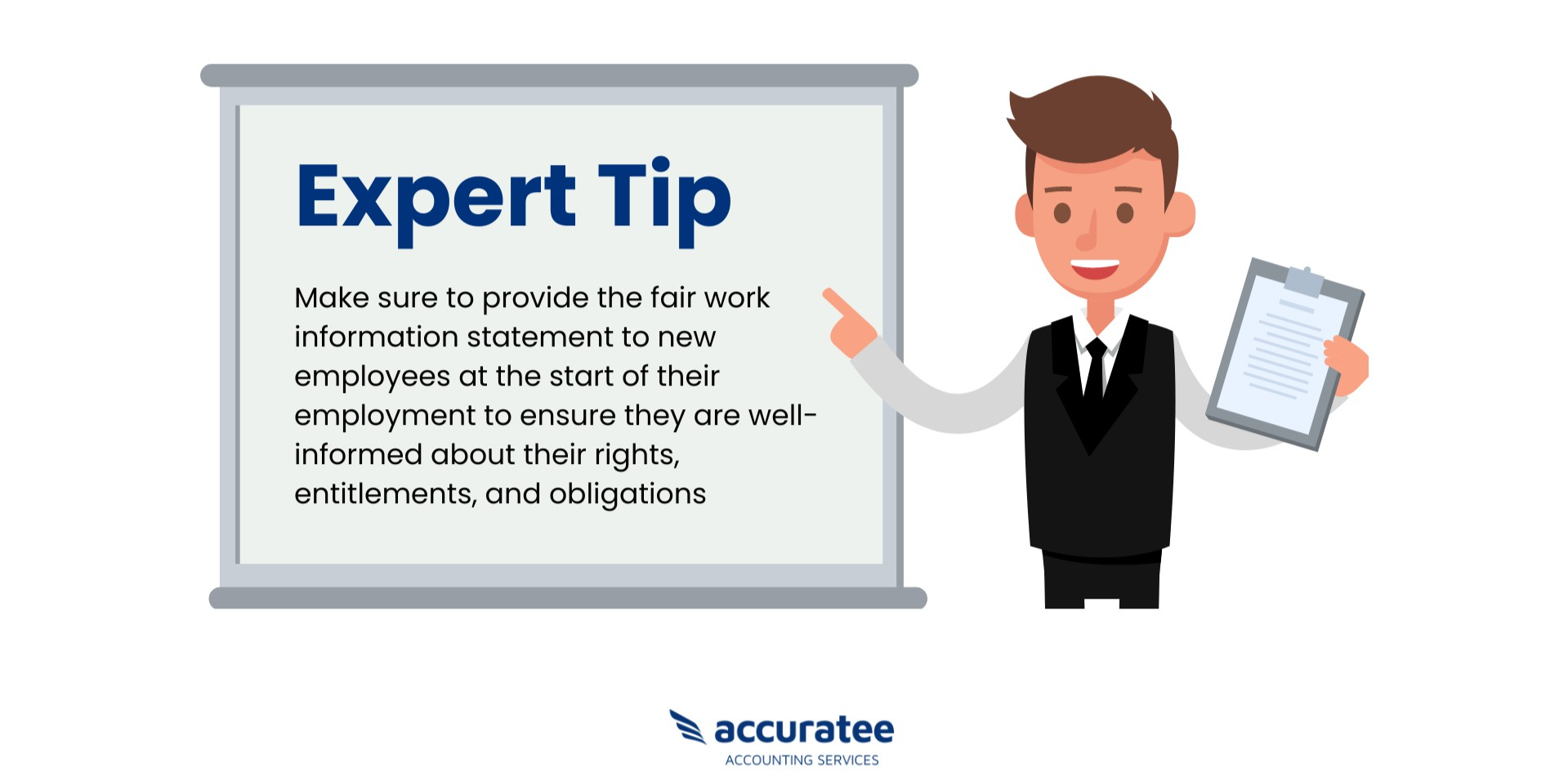Understanding the Australian Fair Work Act and its implications for small businesses
Introduction:
The Fair Work Act 2009, a cornerstone of Australian employment legislation, has far-reaching implications for small businesses, shaping their operational, legal, and human resource policies. The act, by establishing a set of comprehensive standards for fair employment practices, serves as a guidepost for businesses to navigate the complexities of employment relationships.
For small businesses, understanding the act is not just a legal necessity but also a strategic asset that helps maintain a healthy, productive, and compliant workplace.
This article delves into the nuances of the Fair Work Act, including key provisions and their implications, the role of the Fair Work Ombudsman, and the potential consequences of non-compliance, providing a valuable guide for small business owners to succeed within this regulatory landscape.
Key takeaways
The Fair Work Act 2009 regulates employment conditions in Australia, fostering a fair workplace system.
The act encompasses key provisions such as National Employment Standards (NES), modern awards, and registered agreements.
The fair work Information Statement, a mandatory document for new employees, outlines their rights and obligations under the act.
The Fair Work Ombudsman offers guidance on the act, ensures compliance, and can take enforcement action if necessary.
An overview of the Australian Fair Work Act
The Fair Work Act 2009 is a pivotal Australian legislation that regulates employment conditions, aiming to foster a balanced and fair workplace system. It addresses a wide array of employment matters, such as minimum wages, unfair dismissal, and industrial action.
For small businesses, this act is particularly significant as it outlines the obligations that employers must meet and provides a structure for fair employee treatment. The act sets minimum standards for wages and conditions through the national employment standards and modern awards.
It also provides a mechanism for addressing unfair dismissals and regulates industrial actions. In essence, the Fair Work Act 2009 is not just a legal obligation for businesses, but a tool to cultivate a fair, respectful, and productive work environment.
Principal provisions of the Fair Work Act
-
National employment standards (NES)
The National Employment Standards represent a collection of ten minimum employment standards that apply to all employees in the national workplace relations system in Australia. These standards form a safety net to ensure fair work practices across all industries and occupations.
The NES covers a broad range of employment conditions. These include:
- Maximum weekly hours of work,
- Requests for flexible working arrangements,
- Various types of leave (such as annual leave, personal carer's leave, parental leave, and community service leave),
- Public holidays,
- Notice of termination,
- Redundancy pay and,
- Provision of a fair work information statement to new employees.
The NES is designed to provide a fair and comprehensive framework for employment conditions, ensuring that all employees, regardless of their industry or occupation, are entitled to certain minimum standards of employment. Employers are required to comply with these standards and can face penalties for non-compliance.
For small business owners, understanding and adhering to the NES is crucial. It ensures that they maintain fair and lawful employment practices, which can enhance their reputation, improve employee satisfaction and retention, and reduce the risk of legal disputes.
-
Modern awards and registered agreements
Modern awards and registered agreements are integral elements of the Fair Work Act, providing further clarity on the terms and conditions of employment.
-
Modern awards
Modern Awards serve as legal documents that determine the National minimum wage and conditions for employees in specific industries or occupations. These awards cover a variety of employment aspects, including wage rates, work hours, breaks, and overtime. Depending on the diversity of roles in a business, multiple awards might apply.
-
Registered agreements
Registered Agreements, also known as enterprise agreements, are contracts between an employer and the employees. Once the Fair Work Commission approves these agreements, they define the specific employment conditions for that business. These agreements must meet or exceed the standards outlined in the NES and any relevant award.
The fair work information statement
The fair work information statement is a mandatory document that employers, including businesses, must provide to new employees at the start of their employment. This statement serves as a comprehensive guide, offering essential information on various aspects of employment. It includes details about the national employment standards (NES) and modern awards, which set the minimum employment standards and conditions.
The statement also covers agreement-making processes, the right to freedom of association, and the role of the Fair Work Ombudsman. By providing this statement, employers ensure that employees are well-informed about their rights, entitlements, and obligations under the Fair Work Act, promoting a harmonious and productive workplace.

The function of the Fair Work Ombudsman
The Fair Work Ombudsman plays a pivotal role in fostering harmonious, productive, and cooperative workplace relations in Australia. As an independent statutory office, its primary responsibilities include providing education, assistance, and advice about the federal workplace relations system. This encompasses a wide range of employment issues, from pay and leave to ending employment and more.
The Fair Work Ombudsman is also tasked with monitoring compliance with the Fair Work Act. This involves ensuring that employers, including businesses, adhere to the standards and conditions set out in the act. In cases of non-compliance, the Fair Work Ombudsman has the authority to take enforcement action. This can range from issuing cautions and on-the-spot fines to initiating legal proceedings.
For small business entrepreneurs, the Fair Work Ombudsman serves as a valuable resource. It offers guidance on various aspects of the Fair Work Act, helping them understand their obligations and maintain compliance. By doing so, it aids in creating a fair and equitable workplace environment, which is beneficial for both employers and employees.
Implications of the Fair Work Act for small businesses
The Fair Work Act has far-reaching implications for small businesses in Australia, influencing their operations and decision-making processes in significant ways.
-
Influence on employment contracts and workplace policies
The Fair Work Act plays a crucial role in shaping the employment contracts and workplace policies of businesses. It mandates that all employment contracts meet the minimum standards set by the national employment standards (NES) and the relevant modern award or enterprise agreement. This requirement ensures that employees receive fair treatment and that their basic rights are protected.
A notable case highlighting the impact of the Fair Work Act on employment contracts and workplace policies was a Melbourne-based burger bar fined over $300,000 in 2016 for underpaying staff and providing false records to the Fair Work Ombudsman.
This case underscores the importance of adhering to the stipulations of the Fair Work Act in formulating employment contracts and policies.
-
Repercussions of non-compliance
Non-compliance with the Fair Work Act can lead to severe penalties, emphasizing the importance of understanding and adhering to its provisions. Penalties can include fines, orders for compensation to employees, and in extreme cases, imprisonment.
A record penalty of over $500,000 was imposed on a café operator in Perth in 2017 for systematically exploiting overseas workers. This case serves as a stark reminder of the potential repercussions of non-compliance with the Fair Work Act.
Compliance with the Fair Work Act is crucial, but it doesn't have to be burdensome. Let CleanSlate take the reins
Reach out to us now.png)
Protections afforded by the fair work act for small businesses
While the Fair Work Act sets out obligations for employers, it also provides protections for small businesses. One such protection is the Small Business Fair Dismissal Code, which offers protection against unfair dismissal claims, provided the small business adheres to the Code when dismissing an employee. This provision helps to balance the rights of employees with the operational needs of businesses, demonstrating the act's role in fostering fair and balanced employment relationships.
Best practices for small businesses
-
Positive workplace culture
Cultivate an environment where employees feel valued and respected. This can be achieved by setting clear expectations, appreciating diversity, and promoting open communication. For instance, regular team-building activities can foster a sense of community and mutual respect.
-
Employee engagement
Keep employees informed about business goals and performance. Encourage them to share their ideas and feedback. For example, hold regular town hall meetings where employees can voice their thoughts and suggestions.
-
Performance management
Set clear, achievable goals for employees and provide regular, constructive feedback. Offer training and development opportunities to help employees enhance their skills. An employee who recently completed a project successfully could be acknowledged in a team meeting, boosting morale and motivation.
-
Workplace flexibility
Provide flexible work options, such as remote work or adjustable hours, to assist employees in maintaining a healthy work-life balance. This may involve opportunities for part-time work or job sharing.
-
Effective workplace policies
Implement clear policies on key issues like leave, discrimination, health and safety, and social media use. These policies should be easily accessible and understood by all employees. For instance, a clear policy on work-from-home guidelines can help remote employees understand their responsibilities and expectations.
Conclusion
Understanding and complying with the Fair Work Act is essential for any business operating in Australia. The act provides a robust framework for fair and balanced employment and workplace relations, and compliance is key to avoiding legal disputes and promoting a harmonious workplace.
For small business owners, this can seem daunting, but help is at hand. At CleanSlate, we are committed to helping businesses owners navigate the complexities of the Fair Work Act, providing expert accounting services and advice to ensure full compliance. Count on us to navigate the complexities of the Fair Work Act, freeing you to concentrate on your core business activities and excel in what you do best. Get in touch with us today.









